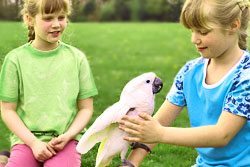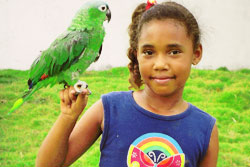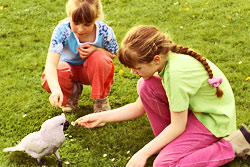
Parrots are not for everyone. The selection of a pet entails a lot of consideration which have to be carefully weighed according to one’s limitations in the capability to provide the right care and attention. This has to be done in order to avoid being unfair to the bird as well as to the other members of the household who are expected to share in the responsibility, especially when the primary caretaker is unable to perform his/her duties.
Children generally love to have pets, no question about that. The question is whether a certain pet is right for a child’s age, health and over-all capabilities. Taking in a pet is a chosen responsibility which has to be taken seriously, for the benefit primarily of the chosen animal. Having a pet is like having an additional member of the family.
Pets contribute a lot to a child’s healthy development. They teach children to take responsibility for something other than themselves. The loss of a pet teaches a child the natural cycle of life. Kids with pets tend to have more empathy towards others. Pet ownership gives a child the opportunity to be in control and allows his/her to care for something, just as their parents have cared for them.

Parrots can be classified under the group of exotic pets. Exotic pets are often used to refer to describe non-traditional pets as differentiated from a dog, cat or fish. It can also be used to describe something that is foreign, different or unusual. Parrots originated from different parts of the world and as such have a wide variety of species having their own peculiarities. Some species still do not have the extensive information needed to determine its potential as a pet bird.

In choosing a parrot for a pet especially for children, impulse buying or adoption should definitely be avoided. Owners must have the sufficient knowledge about the species even before deciding to take a parrot home. The necessary equipment and supplies should also be at hand for the transition.
Parrots are loud, prone to destructiveness and tantrums and require a lot of attention and cleaning. Its long lifespan is a major consideration since the owner’s responsibility is co-existent with its life. Different parrot species react differently to children.
Conures generally do well with children under the supervision of adults, but there are reports of Conures being unable to tolerate children and bite them. Some Poicephalus Parrots are very tolerant to the point of being friendly and gentle around children. Macaws are unsuitable as pets for children without proper adult supervision since all Macaw species have very powerful, large beaks that can cause considerable harm to children and adults as well. In the subject about children and parrots, there is nothing definite. It would be very hard to second guess what individual parrots or any other pet for that matter will do at any given time. Thus, it is best to protect the children from harm by always being aware of the risks and taking the necessary steps to prevent it.